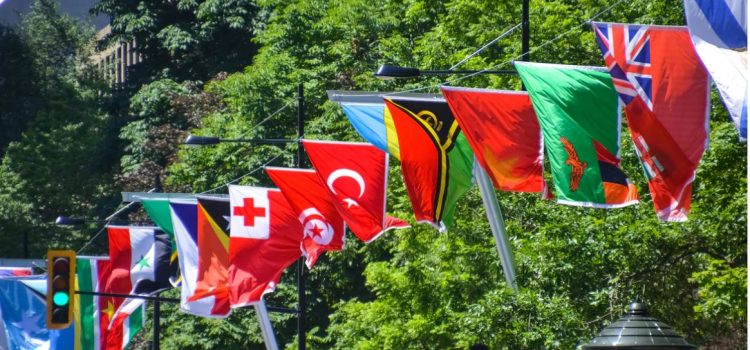

This article is an excerpt from the Shortform book guide to "Imagined Communities" by Benedict Anderson. Shortform has the world's best summaries and analyses of books you should be reading.
Like this article? Sign up for a free trial here .
Where does the idea of “nationalism” stem from? What is Benedict Anderson’s theory of nationalism?
According to Benedict Anderson, the author of Imagined Communities, the nation is simply a social construct. It has no biological or historical basis.
Continue reading for Anderson’s nationalism theory.
Nations Are Created Concepts
Benedict Anderson’s theory of nationalism says that, given this deep level of emotional commitment, it’s easy to assume that nations represent a natural way of organizing human beings into political communities. However, Anderson argues that this assumption is wrong—the nation in its modern form is a relatively recent political invention, going back no further than the 18th century (we’ll explore this history later in this summary).
He writes that the nation—and the ideology of nationalism that sustains it—was created by a unique combination of historical forces that came together at a particular time. Nations are not “natural” or “eternal.” Instead, nations and national communities are constructed identities. They have no “real” or “organic” basis in biological science or history.
| Racial and Pseudoscientific Theories Although nations may be politically engineered communities, this does not mean that nationalist theorists haven’t tried to define the nation in terms of some essential, biological, natural basis. This was one of the primary goals of the pseudoscientific racial theorists of the 19th century. These figures, often heavily influenced by Charles Darwin’s theory of species struggle and survival through natural selection, believed that there was a racial and biological hierarchy of the world’s peoples that could be categorized and classified like the animal and plant kingdoms—and that, by virtue of their natural superiority, the white or “Aryan” race belonged at the top of the proverbial food chain. The racial and pseudoscientific theories provide much of the ideological basis of modern-day arguments for who does or does not “belong” in a national community, inspiring xenophobic politics the world over. This has perhaps been most acute in Europe, where recent influxes of darker-skinned, predominately Muslim immigrants have sparked anxieties about whether or not the distinct national cultures and perceived ethnic identities of nations from France to Sweden are compatible with a growing population of non-white, non-Christian, non-Europeans. |
Nationalism Constructs a Single National Community
Anderson argues that nationalism socially constructs a shared identity that binds strangers from different communities together into a single national community. Although your nation may consist of tens of millions of people—the overwhelming majority of whom you’ll never personally know or even meet—nationalism provides the intellectual framework for you to think of yourselves as members of a singular community with a shared identity.
| Gossip and Community Formation Some evolutionary anthropologists have argued that even early humans managed to establish communities that extended beyond their immediate, personally known kin groups using a somewhat surprising mechanism—gossip. In The Happiness Hypothesis, Jonathan Haidt argues that gossip, the sharing of social information about people, was likely an important element in group formation for early humans. Gossip reinforced positive social norms by making our ancestors aware of the misdeeds of people outside the immediate kin group whom they may not have personally known—bolstering both altruism and reciprocity, by ensuring that selfish people didn’t receive cooperation, while altruistic people did. In fact, evolutionary psychology suggests that gossip may have been one of the earliest purposes of language itself. The sharing of important social information that it facilitated enabled humans to survive in larger and larger social groups. And as we came to live in settled agricultural communities where we needed to interact with greater numbers of people, natural selection favored the evolution of larger brains to accommodate for new and necessary cognitive tools like language. |
Insiders and Outsiders
Anderson further argues that nations are an effective means for sorting people into in-groups and out-groups—people who belong to the national community and people who don’t.
Because nationalism is constructed, an outsider usually can’t “prove” that they belong to the national community by appealing to some neutral, empirical evidence. Instead, those already within the community establish the rules for who does and doesn’t belong.
The rules for who does and doesn’t belong don’t always permanently prevent outsiders from becoming part of a nation. Most modern nations have processes of naturalization whereby outsiders can legally become part of the national community and gain citizenship by adopting and conforming to that nation’s rules. Sometimes this process is based on pre-established rules of “belonging”—some nations automatically extend the option of citizenship to certain classes of people outside their borders on the basis of religion, as with Israel’s Law of Return, which extends the option of citizenship to any Jewish person willing to settle in the country, or on the basis of familial descent, as with Ireland’s nationality laws, which allow any person living anywhere in the world to apply for Irish nationality if they have one grandparent born in the country.
Despite this possibility of an “outsider” joining the national community, Anderson argues that there is a fundamentally exclusive character to nationalism. Unlike religion or other secular political ideologies, nationalism does not—and by definition cannot—make claims to universality. Anyone can become a Buddhist; anyone can become a communist; but not everyone can become Japanese. According to Anderson, there must be people who fall outside the bounds of the nation, because a nation’s constructed identity is as much about what it isn’t as about what it is.
| As we explore Anderson’s analysis of what it means to be a member of a nation, it’s important to distinguish between two related but separate concepts—nationality and citizenship. Under international law, nationality is usually an attribute acquired by birth or descent. It is a “natural” state—simply by being a living human, you have nationality somewhere. Citizenship is a legal concept, establishing the relationship between an individual and a state, including the benefits and obligations that person has by virtue of their citizenship. But citizenship can exist entirely separate from nationality. For example, according to the Constitution of Mexico, all persons born in Mexican territory or born abroad to Mexican citizens are considered Mexican nationals. Thus, they automatically acquire nationality at birth. However, they only become citizens with enumerated legal rights and responsibilities upon turning 18. |

———End of Preview———
Like what you just read? Read the rest of the world's best book summary and analysis of Benedict Anderson's "Imagined Communities" at Shortform .
Here's what you'll find in our full Imagined Communities summary :
- An exploration of the phenomenon of nationalism throughout history
- Why the idea of "the nation" is purely a political innovation
- How the rise in literacy and the printing of books fueled nationalism






